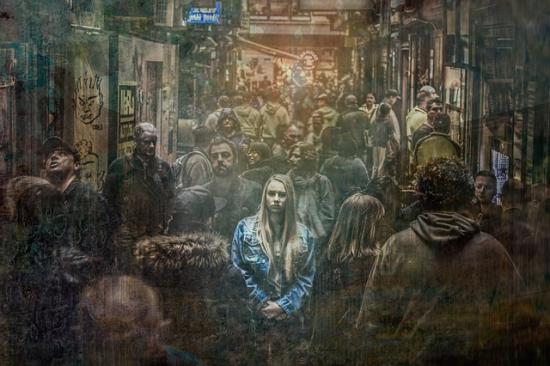
It’s the mid-1990s. I’m in my high school journalism class, writing movie reviews because the thought of interviewing other students is too intimidating. I’m the only male in the same class of about 10 girls for three years; I’m too scared to talk to them, so I revert to working on a computer in a back room. I graduate high school with one signature in my yearbook. . . .
It’s 2003. I’m in my early twenties, and my best friend and I have traveled to her aunt’s house down South for the weekend. I’m chatty and silly with my friend, but as soon as I meet these strangers, I clam up. I retire to my room for a nap and spend large amounts of the first day sitting quietly on the couch, my mouth dry, too afraid to answer a single question. Later, they ask my friend if everything is okay with me, or if I have some sort of impairment. . . .
I’m in my mid-twenties. Parties are hell, particularly in groups where I don’t know anyone. I sit on a couch or find a corner to quietly sip my Pepsi. I know I come off as standoffish, but the thought of holding down a conversation is too terrifying. I’m scared of looking like an idiot, tripping over my words, and I’m uncomfortable in my own skin. I do okay in one-on-one situations, which is how I get through dates. But once they introduce me to friends or family, I shut down. I don’t want to; I simply am grasped by an unreasonable fear. . .
A history of public fear
I don’t know when I began suffering from social anxiety. I was an outgoing, ebullient child. I had a lot of friends. I’d strike up conversations with the missionary kids whose parents visited our church, and I went out for the fifth grade basketball team despite being short, scrawny and having no athletic prowess. My friends’ parents often remarked that I’d tell the best stories (now pushing 40, I realize that’s code for, “your kid never shuts up”).
Maybe it happened when we moved and I entered sixth grade at a new middle school. Maybe it was teenage awkwardness and out-of-control hormones that made me feel different from others. Perhaps it was evangelical culture, which so stressed persecution and isolation that my defenses were raised any time I walked into my public school, convinced everyone hated me and consoling myself with the self-righteous rationalization that they were all hellbound.
Whatever it was, it created a complex that plagues me to this day. If I’m in an unfamiliar social situation, everything in my body tenses up and my anxiety rushes at me. I can’t make small talk in a room of strangers, convinced that every word I say is going to sound stupid or fearing that I just don’t have the mental ability to connect with them and seem normal. I worry about falling over, spilling or breaking things in people’s homes, or having unanticipated bathroom emergencies. If eating is involved, forget about it.
This leads to a lot of misconceptions, I’m sure. People might think I’m aloof or uptight, perhaps they even think I don’t like them. That’s generally not the case. I used to think that I was an introvert, and that I didn’t like being around others. But in instances where I let my guard down and am vulnerable with others, I find myself energized, not exhausted. Few things make me happier than being with other people, laughing hard and sharing stories. It’s just that if that number jumps to more than two or three strangers, something seizes my controls. The fun-loving side of me is shoved into a corner and some terrified, deer-in-the-headlights imposter takes over. This means parties are out of the question. Luncheons or anything requiring schmoozing is a no-go. Heck, it takes me a long time to even warm up to people at work (I’ve been at my current job just over five years and have just felt comfortable enough to joke around and be somewhat outgoing in the last year).
It’s gotten a little better with time. I’ve been on a low dose of an anti-anxiety medication on and off for the last few years. Initially it was to help with panic attacks following some medical issues years back, but I’ve found it to be a great help with social situations. Alcohol in moderation is also a nice crutch (my relief goes up when gatherings are at a bar or weddings have wine). Self-awareness has also been key. Now when I go into social situations, I don’t assume my nerves have anything to do with people being out to get me or me not belonging. I know it’s my issue and I try to find ways to control it, whether it’s finding two or three people I know and clinging to them, sipping a drink, or telling myself to take it ten minutes at a time. It’s not a perfect strategy, and the anxiety sometimes still takes control, but at least it helps me endure.
Anxious people in a communal faith
As you might imagine, church is sometimes difficult for people who suffer from social anxiety. From the “forced fellowship” (that time in the service where the worship leader asks you to turn and greet your neighbor) to the after-church milling in the lobby, it’s a minefield of trying to avoid small talk and awkward situations. Again, it has nothing to do with liking or disliking people, so much as the general fear of your own tendency to babble, trip and screw things up. And potlucks? Forget about it.
In many cases, social anxiety gives you an excuse to avoid stressful situations, retire to your home and avoid meeting new people. But here’s the kicker: Christianity, at its core, doesn’t really allow for that option. While there is a private, internalized component to our faith, Christianity is a religion of people. You’re called into a kingdom. You’re part of a family. The Bible teaches that every person is essential, that we’re a corporate body. The older I get, the more convicted I become that my dart-out-without-a-word faith is antithetical to Christian living.
I know this, both at heart and from experience. I have rarely been happier than during the times when I have been part of a group of like-minded believers who were open and vulnerable with each other. Nights involving big laughs, quiet times involving hard tears, cups of coffee over hard conversations. Those are the richest and most rewarding times of my life. In the last 10 years, I’ve had to leave the church where many of those experiences took place, and I miss the people there. I want to have that again. It’s not the depth and vulnerability that scare me, but trusting people enough to take those tentative steps to friendship. That’s the hard part.
That’s not always understood by those who don’t suffer from this affliction. People concoct icebreakers to try to build comfort in new situations without realizing that spontaneous silliness is a nightmare to the socially anxious. Wives tell husbands “just go make friends” without understanding there’s a strong, irrational fear that seizes them — and listen, we know our fear is irrational; it doesn’t make it any weaker. People mistake it as jitters or shyness without grasping the true, very physical sensation that grips us.
And so people don’t understand. And the socially anxious head home, isolate themselves and often don’t plug in to the very things that they need. I know this because this has often been my practice. And while I’m often well aware of what I’m missing, that deficiency always feels preferable to the terror of being exposed, at least in the moment.
Face your fears
I feel like every week, I see a new article on social media telling others how to live alongside introverts with tact and compassion. Like I said, I don’t really consider myself an introvert so much as an extrovert with some very specific fears. But I sympathize with much of the advice given.
There are probably many things churches can do to be more open to people with social anxiety. Don’t dismiss it or stigmatize it as something people just have to snap out of and get over. Maybe reconsider the idea of forced fellowship or make spaces in your lobbies more conducive to small, quiet conversations instead of big gatherings. I know I feel a lot more comfortable if I can talk to a friend one-on-one on a couch or at a cafe table than I do standing in the middle of a crowded room. Patience and understanding are also key. Don’t assume that someone is anti-social or disinterested in getting involved just because they’re quiet or aloof. Invite them to things. Befriend them; sometimes it just takes one conversation to make someone feel comfortable. Sometimes those conversations need to take place outside of crowded settings, in coffee shops or bars. And don’t write them off; as time goes on and trust builds, those walls will often come down.
But it’s not just churches that need to change, just as it’s not extroverts who just need to accept the introverts. To be truly part of the family and build the relationships Christ calls us to, we sometimes have to confront our fears and learn how to push through them.
This is, of course, difficult, because fear is such a palpable, real part of us. It feels natural and part of our make-up to be afraid, and doing the things that scare us means putting aside some of the measures we’ve put in place to protect ourselves. But like I said in an earlier post, a big part of growth is becoming a better version of yourself. And that involves taking steps to improve and overcome your anxieties.
I don’t have any tips for how to do that right now. Much of this post is written as a rebuke to myself. Maybe once I’ve made some headway with my own social anxiety, I can provide some tips as to how to go about it. Right now, I’m trying to push myself. I’ve joined a party-planning committee at work to force myself into social situations. I’m praying about how to get involved in other ways at my church. I’m avoiding less social situations, even if it means right now I have to limit myself to 30 minutes before I leave. Baby steps.
I don’t consider social anxiety to be a sin, but my tendency to let it keep me from building relationships and getting involved is. I don’t have to transform into the life of the party, but I do have to trust that community requires vulnerability and faith requires that I do things that I’m afraid of. And if I want my faith to be something more than an internal, intellectualized thing, engagement and relationships are vital. And so the gospel confronts my fears and hangups, asks me to trust and calls me to change. Because “do not fear” is one of the most common commands in Scripture. And while we might consider socializing to be a small part of being a Christian, community is actually part of our faith’s texture. I pray we’ll be able to move past it.

















